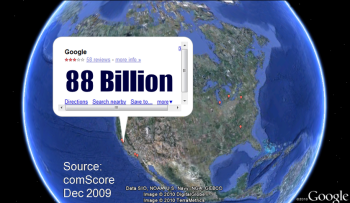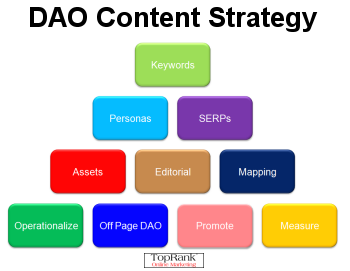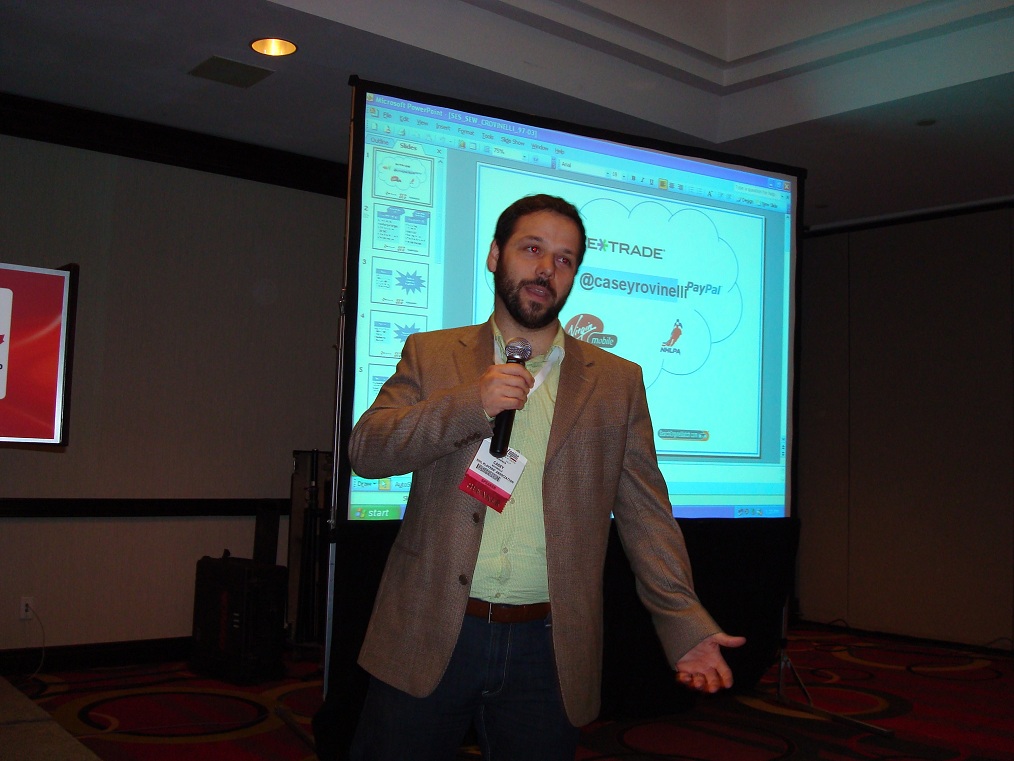In a recent blog post discussing the importance of link building for search engine optimization, I asked people to share how they build links to their website. I recommend you go read the responses. I also recommend you read that article so you know how to construct inbound links so they affect your search rankings for individual keywords that you want to rank for.
In that article, I said I'd be writing a follow up article about "how" to build links to your site.
Link building is not easy. And it's not that intuitive until you do it. There are also many different techniques and methods that will have varied results. Below is how I recommend clients start and master link building.
I tell people that there are 4 Levels of Link Building Excellence. And it usually takes 4 years to master it - just like high school:
9th Grade: Links You Can Build Yourself That Require Little Time Investment
Before I get into this, I'd like to stress that you should have a really good keyword strategy and make sure you've optimized each page on your site around a different keyword phrase. Any link you're building should be designed to help a specific page rank high in the search engines for a specific keyword.
That said, the first set of links that every business should get are the ones that don't require anyone else's help. There are lots of business directories out there where you can just submit your URL, company name and a description of your business. Some of them require approval. Some of them require a fee. Yahoo's directory, Joe Ant, Aboutus.org are some of the ones you should do right away.
In this class of Level I links, there are also many social media sites where you can simply build links to your site. Most of these no longer pass SEO credit, but they're still good links to get, assuming your target audience visits the site or these sites rank high for your keywords already.
It's arguable that you should hire someone to do (or start) this stuff for you. It's low level work that generates low level returns. Just make sure that you don't hire a firm that will get you 1,000 links for < $1,000 dollars. If it's too good to be true, it is.
10th Grade: Links You Build Yourself that Require Effort
Before I get into this level, I'd like to stress that launching a business blog should be done before doing this. Without having a blog on your site with lots of good well optimized content, you don't really have anything to link to.
That said, there are two very common link building techniques that work well that don't require you to be a "thought leader". Yet. These activities require a bit more time investment and a small financial investment. They are article marketing and press release optimization. With both of these methods, you have to create relevant content that will appeal to your market. So, it requires more time than Level I. Also, the process of getting your articles syndicated and your press releases submitted and picked up - takes effort. You might consider hiring a wired pr firm or a strong seo firm to do some of this stuff for you.If done correctly, both of these methods can significantly increase the links to your site. Also, if you write your articles and press releases with a keyword strategy in mind, and with links that support your keyword strategy, it can significantly raise your rankings for specific keyword terms. Run your press releases and your articles through press release grader to determine whether they're going to help.
11th Grade: Links You Network For that Require a Significant Time Investment
This part of link building is kind of like sales. Cold calling can be done effectively with persistence. But, networking, getting referrals, giving first, the law of attraction, etc is a better way of getting new clients.
Link building is the same way. If you're more of a cold caller type, and there are lots of potential places you can get a link, you might consider just creating a list of webmasters and asking them for a link.
If you're a natural networker and you're in this for the long haul, I'd recommend being a bit more patient. Apply your persistence and spend your time building relationships.
No matter what route you take, the goal of this level is to make yourself visible among people interested in the same topics as you. This process is a bit self promotional. But, you must promote yourself in a way that you're adding value. You master this level by acting like a resource for people in your industry. How do you do this? It's all about networking and building meaningful relationships. The first step is reading other people's blogs. Then, commenting on them. Then, eventually starting a relationship where you're communicating 1 on 1 with them. I recommend you take the leap from reader to 1:1 with a blogger, by pointing them in the direction of other people's content that might be interesting to them. In the non marketing world, this usually happens through email. In the marketing world, this usually happens through Twitter. If you're techy, this might happen through Delicious. If you use StumbleUpon or Digg, those are great platforms to share things with peers. Even google reader lets you do this kind of networking. But, it can certainly happen through any social networking platform or system that enables 1:1 communication.
From a link building perspective, the ultimate goal of this level is to get invited to write a guest article for other people's blogs or website. For example, I wrote an article about inbound lead generation for Aaron Ross not too long ago. In the article, I linked to relevant resources on my blog and the HubSpot blog and site. These are great links from an authoritative source. Aaron reaches our target market sending relevant traffic. These links also help us rank for our target keywords.
During this process, you're also building up a group of people that will most likely begin following you...
Seniors Rule! (12th Grade): Links Other People Give You Because You Create Remarkable Content.
This level is like the last month or two in high school when you've already passed mid terms and you've been accepted to the college of your choice. You've done the hard work already. Now, it's time to go to parties and enjoy being the care free big man on campus.
You don't necessarily halt the activities above. But, you spend more of your time just creating remarkable content. (And some link bait.)
At HubSpot, we do some guest articles once in a while and we optimize our press releases. But, mostly we just put time into churning out content on our blog and producing other online marketing resources like webinars and white papers. Some of you seem to think this stuff is pretty remarkable. As a result, it generally creates great conversations in our comments, strong attendance at our webinars and lots of white paper downloads. And regularly, people link to our webinar announcements and blog articles of their own accord.
This doesn't start happening overnight, unless you're already famous. We have a lot of advantages at HubSpot. Website grader's success, funding in the bank, successful clients, smart founders who started blogging before they had a product and now... a lot of employees who contributor to the blog, a strong social media following, etc.
But, we did it in < 2 years. If you're a small business and you follow the path above, there's no reason why you can't stake your claim on the web. Link building is an important part of that. Hopefully, this post demystifies the process a bit and gives you a roadmap to get started.
The biggest mistake that newbie internet marketers make is thinking that creating great content on their blog will be all it takes to be successful internet marketers. My biggest frustration is when newbie bloggers pack up shop after just a month of writing because the blog doesn't have an immediate impact on their search traffic and lead volume.
At the end of the day, if you publish great content on the web AND connect, relate and build relationships with other humans, really good links will come naturally. Until then, put in some homework and earn your way through link building high school.
Photo by CarbonNYC
Posted by Pete Caputa on Tue, Sep 30, 2008 @ 08:15 AM
COMMENTS
Pete, this is an exceptional post. In Marketing 101 we are taught the four Ps of "traditional" outbound marketing (product, price, place, promotion). What you have defined here are the four Ps of inbound marketing — Profiles (directories, social networks), Publishing (articles, optimized press releases, etc.), Participation (in blogs, forums, social networks) and Publishing (great, multi-media content). And yes, I know Publishing is in there twice, but it's that important. Inbound marketing comes down to continually publishing great content. Nice work!
posted on Tuesday, September 30, 2008 at 10:40 AM by Paul Roetzer
Thanks Paul. I agree that "publishing" deserves a second mention. Did you just make this 4 P thing up? I think that'd be a good guest post.
posted on Tuesday, September 30, 2008 at 10:47 AM by Pete Caputa
Pete,
I appreciate how you broke the idea of link-building down into tactical "grades." Nice idea! I also agree fully that having a corporate blog should be a major portion of any web strategy, though the reasons for blogging and the way the blog is managed may differ among B2B and B2C companies. I just posted a newsletter on blogging, specifically targeting B2C professional services companies.
Best,
Chrisposted on Tuesday, September 30, 2008 at 10:54 AM by Chris Butler
Pete - this is great. Not enough people break down the ideas we're all hearing about into actionable plans. WRT SEO'ing your articles and releases, how many marketers have been able to "train" their existing agencies on doing this, versus finding a new PR agency that takes a more comprehensive social media approach? Is it worth it, if you have?
The other thing that would be so helpful for this guide... Time estimates, especially for the underclassmen. For example, when you transition to HS, there's an emphasis on time management, guiding students on how long they should spend reading, studying, etc. This transition to link building can be overwhelming; there's so much noise and so many distractions. Should you set aside a window of time, a certain amount of it each day? Or a certain number of comments or posts or links that you try to achieve each day? Should you designate some percentage of a headcount on your marketing team for just this? (I see that HubSpot is hiring a FT person just for this, so I guess I know what the answer is!) That gives a real target for people.
Thanks so much for doing this. Really interesting stuff...posted on Tuesday, September 30, 2008 at 11:07 AM by Katie Poplin
Great questions, Katie.
I'm not the best guy to talk to about time management. I get distracted easily. (I'm in sales actually, so I should be calling people instead of using Twitter and writing blog posts.)
But, in principle, what you're suggesting about time management is necessary. It seems that people "never get started w/ link building" because they have a million other things to do.
There are some smart people at HubSpot trying to make it easier for our clients to do link building on a regular basis. But, at the end of the day, the marketer or biz owner has to have some discipline to create content, interact w/ people online and build links.
Re: training a traditional PR firm to do online PR, I start by sending them to Press Release Grader. I have one client/partner who is an SEO consultant and she works with a traditional PR company who is very good at traditional stuff. The SEO consultant does keyword research, guides blogging content production, reviews press releases, and runs social media marketing w/ traditional agency oversight.
I think teaching old dogs new tricks is hard, personally. But, sometimes it is necessary. Traditional agencies still add a lot of value with TV, event, print and radio exposure.
Paul Roetzer wrote a really cool article the other day called, The Dawn of the Inbound Marketing Agency.
At HubSpot, we're seeing a lot of demand from traditional agencies who want to "learn internet marketing". I think they'll need to adapt or at least broaden their offerings to include online marketing, if they want to survive.
Did You Graduate From Link Building High School Yet?


 Comments
Comments





 88 billion (OK, 87.8, we rounded up). That’s the number of search queries Google web properties are responsible for each month according to comScore.
88 billion (OK, 87.8, we rounded up). That’s the number of search queries Google web properties are responsible for each month according to comScore.

 B2B marketers have always been in the business of “content marketing“ with white papers, case studies, webinars, demos, free consultations, ebooks and the like. Longer sales cycles due to more complex products and services and business purchasing processes often require more information. The content used to educate buyers of B2B products and services can be a very valuable asset when it comes to content optimization and acquiring leads via organic search.
B2B marketers have always been in the business of “content marketing“ with white papers, case studies, webinars, demos, free consultations, ebooks and the like. Longer sales cycles due to more complex products and services and business purchasing processes often require more information. The content used to educate buyers of B2B products and services can be a very valuable asset when it comes to content optimization and acquiring leads via organic search.
 I’ve been thinking about how entering the content marketing space is not for the faint of heart. It can be a signifcant undertaking both in terms of resources and a change in an organization’s approach to marketing and sales. Obviously, content marketing is better for some companies and industries than others. Outside help also makes a difference.
I’ve been thinking about how entering the content marketing space is not for the faint of heart. It can be a signifcant undertaking both in terms of resources and a change in an organization’s approach to marketing and sales. Obviously, content marketing is better for some companies and industries than others. Outside help also makes a difference.
 Since late 2009 when Google introduced real time search, the concept has gained a lot of attention.
Since late 2009 when Google introduced real time search, the concept has gained a lot of attention. Think branding only falls in the B2C court? Think again.
Think branding only falls in the B2C court? Think again.
 At Online Marketing Blog, content marketing is frequently a hot topic. And with good reason: it’s a vital skill for marketers. Not only do we at TopRank Online Marketing see great results implementing content marketing for clients, but the industry as a whole sees it as a clear trend. Consider the following stats:
At Online Marketing Blog, content marketing is frequently a hot topic. And with good reason: it’s a vital skill for marketers. Not only do we at TopRank Online Marketing see great results implementing content marketing for clients, but the industry as a whole sees it as a clear trend. Consider the following stats:
 So here I sit in the DFW airport hanging out with David Berkowitz and Joe Morin waiting for my connection to Austin. What better way to spend that 45 min than to write a helpful blog post? A big part of my “mission” for SXSXi is to create content after all.
So here I sit in the DFW airport hanging out with David Berkowitz and Joe Morin waiting for my connection to Austin. What better way to spend that 45 min than to write a helpful blog post? A big part of my “mission” for SXSXi is to create content after all. Relevant, Consistently Updated Content + Flawless Technical Functionality & User Experience = Perfect Blog Launch
Relevant, Consistently Updated Content + Flawless Technical Functionality & User Experience = Perfect Blog Launch With the increasing emphasis on content marketing for both SEO and Social Media, I thought I’d offer some specific tips on dealing with one of the most prevalent issues companies face in this area: long term sourcing of content. While we’ve written about content sourcing for corporate blogs in the past, but this post will emphasize how to use social media darling Twitter to find a goldmine of useful resources, tips and information that your customers will love and keep coming back for more.
With the increasing emphasis on content marketing for both SEO and Social Media, I thought I’d offer some specific tips on dealing with one of the most prevalent issues companies face in this area: long term sourcing of content. While we’ve written about content sourcing for corporate blogs in the past, but this post will emphasize how to use social media darling Twitter to find a goldmine of useful resources, tips and information that your customers will love and keep coming back for more. Time after time, when I discuss the search and social media based opportunities for companies to reach new customers and achieve other online communications goals, it comes down to content. Most companies understand the need to have a web presence and publish some kind of web site. For many, the creation of a web site is a one time event with minimal updates. Marketing budgets are tight and companies are frugal.
Time after time, when I discuss the search and social media based opportunities for companies to reach new customers and achieve other online communications goals, it comes down to content. Most companies understand the need to have a web presence and publish some kind of web site. For many, the creation of a web site is a one time event with minimal updates. Marketing budgets are tight and companies are frugal. One of the biggest fears for web site owners that have long relied on search traffic for new business is a sudden drop in search engine rankings. Some webmasters are experiencing this very situation as a result of Google’s recent Mayday update (Matt Cutts video).
One of the biggest fears for web site owners that have long relied on search traffic for new business is a sudden drop in search engine rankings. Some webmasters are experiencing this very situation as a result of Google’s recent Mayday update (Matt Cutts video). Maile Ohye, Senior Developer Programs Engineer, Google delivered the morning keynote on day two of Search Engine Strategies Toronto. Maile discussed Google’s approach to helping site owners and shared answers to burning questions from the moderator and audience.
Maile Ohye, Senior Developer Programs Engineer, Google delivered the morning keynote on day two of Search Engine Strategies Toronto. Maile discussed Google’s approach to helping site owners and shared answers to burning questions from the moderator and audience.
 Images as an asset for organic search results and search engine optimization are often overlooked. Images can drive traffic through image search as well as inclusion in universal search results.
Images as an asset for organic search results and search engine optimization are often overlooked. Images can drive traffic through image search as well as inclusion in universal search results. It’s a common story: an online marketing professional returns from a conference full of exciting new ideas and tactics, only to fail at selling those ideas internally. In many cases, marketing and IT/development professionals don’t always understand each other, and as a result potentially high value projects stall out and never see the light of day.
It’s a common story: an online marketing professional returns from a conference full of exciting new ideas and tactics, only to fail at selling those ideas internally. In many cases, marketing and IT/development professionals don’t always understand each other, and as a result potentially high value projects stall out and never see the light of day.
 There are many intersections between earned media and organic search engine rankings, so it makes sense that they would work well together. The PR industry is in an interesting situation right now with so much of the traditional media world moving to digital media. Whether they admit it or not, journalists rely on PR professionals for a pipeline of stories and information. When journalists lose their jobs, media relations professionals lose an essential reason for being in business.
There are many intersections between earned media and organic search engine rankings, so it makes sense that they would work well together. The PR industry is in an interesting situation right now with so much of the traditional media world moving to digital media. Whether they admit it or not, journalists rely on PR professionals for a pipeline of stories and information. When journalists lose their jobs, media relations professionals lose an essential reason for being in business.
 There simply is no substitute for well rounded experience over a period of time to give a search marketer perspective and the skills to handle a variety of problems. Add to that “sink or swim” SEO training and you have a guy like Matt Evans, SEO Manager at Monster.com. In this interview, Matt is generous with sharing his experiences working agency side and in-house, insights toward code SEO, the new Google design, social media, advice for marketers that want to enter the Search Engine Marketing field and how SEO is a lot like Rugby.
There simply is no substitute for well rounded experience over a period of time to give a search marketer perspective and the skills to handle a variety of problems. Add to that “sink or swim” SEO training and you have a guy like Matt Evans, SEO Manager at Monster.com. In this interview, Matt is generous with sharing his experiences working agency side and in-house, insights toward code SEO, the new Google design, social media, advice for marketers that want to enter the Search Engine Marketing field and how SEO is a lot like Rugby.
 For every SEO guru speaking at a conference, there are 10 or 20 more SEO experts you might not have heard of, making things happen in amazing ways. Scott Skurnick has worked in the Search Marketing industry as long as anyone I know on the conference speaking circuit and has a tremendous amount of experience and expertise to share.
For every SEO guru speaking at a conference, there are 10 or 20 more SEO experts you might not have heard of, making things happen in amazing ways. Scott Skurnick has worked in the Search Marketing industry as long as anyone I know on the conference speaking circuit and has a tremendous amount of experience and expertise to share. When it comes to marketing in the current economy, small businesses need all the help they can get. They don’t have the ad budgets, the personnel or the time that the bigger competition has. But none of those factors really matter to search engines, and SEO is a great way to both level the playing field and steal marketshare.
When it comes to marketing in the current economy, small businesses need all the help they can get. They don’t have the ad budgets, the personnel or the time that the bigger competition has. But none of those factors really matter to search engines, and SEO is a great way to both level the playing field and steal marketshare.
 There are currently 29.6 million small businesses in the U.S. (SCORE). 63% of consumers and small business owners use the Internet to find information about local companies and 82% use search engines (Webvisible & Nielsen). That means there’s a lot of opportunity for local SEO.
There are currently 29.6 million small businesses in the U.S. (SCORE). 63% of consumers and small business owners use the Internet to find information about local companies and 82% use search engines (Webvisible & Nielsen). That means there’s a lot of opportunity for local SEO. Working with Enterprise SEO projects is compared to smaller company sites is as different as marketing to BtoC vs. BtoB customers. This interview with Dan Perry, the SEO Director for Turner Broadcasting covers his SEO dream job, in-house SEO career advice and skills, enterprise SEO, the future of outsourcing to agencies, being persuasive inside organizations and of course, Golf!
Working with Enterprise SEO projects is compared to smaller company sites is as different as marketing to BtoC vs. BtoB customers. This interview with Dan Perry, the SEO Director for Turner Broadcasting covers his SEO dream job, in-house SEO career advice and skills, enterprise SEO, the future of outsourcing to agencies, being persuasive inside organizations and of course, Golf!